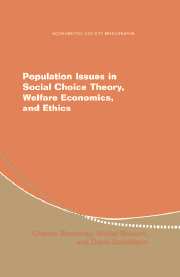Book contents
- Frontmatter
- 1 Introduction
- 2 Measurement of Individual Well-Being
- 3 Welfarist Social Evaluation
- 4 Fixed-Population Principles
- 5 Population Principles
- 6 Characterizations and Possibilities
- 7 Uncertainty and Incommensurabilities
- 8 Independence of the Existence of the Dead
- 9 Temporal Consistency
- 10 Choice Problems and Rationalizability
- 11 Applications
- References
- Author Index
- Subject Index
6 - Characterizations and Possibilities
Published online by Cambridge University Press: 05 January 2013
- Frontmatter
- 1 Introduction
- 2 Measurement of Individual Well-Being
- 3 Welfarist Social Evaluation
- 4 Fixed-Population Principles
- 5 Population Principles
- 6 Characterizations and Possibilities
- 7 Uncertainty and Incommensurabilities
- 8 Independence of the Existence of the Dead
- 9 Temporal Consistency
- 10 Choice Problems and Rationalizability
- 11 Applications
- References
- Author Index
- Subject Index
Summary
Part A
A characterization establishes an equivalence between a set of axioms and a class of population principles. Thus, each member of the class satisfies all the axioms and, in addition, no principle outside the class satisfies all of them. Impossibility theorems reveal inconsistencies among axioms and remind us that axioms should not be considered in isolation. In this chapter, we present characterizations of most of the population principles discussed in Chapter 5 together with a pair of closely related impossibility theorems. Many of the axioms used here are introduced in Chapters 4 and 5. We say that a population principle or social-evaluation ordering satisfies a fixed-population axiom if and only each same-number subprinciple or same-number social-evaluation ordering satisfies it.
Consider the number-sensitive critical-level generalized utilitarian(NCLGU) class, for example. As mentioned in Chapter 5, each member of the class satisfies continuity, strong Pareto, same-number independence, and utility independence. In addition, all critical levels exist, are independent of utility levels, and may depend on population size. Although these properties can be used as axioms to characterize the NCLGU class, some are redundant: same-number independence is implied by utility independence, and intermediate existence of critical levels and utility independence together imply that all critical levels exist and are independent of utilities. It follows that a smaller set of axioms – continuity, strong Pareto, intermediate existence of critical levels, and utility independence – characterizes the NCLGU class. In addition, the axioms are independent: there are non-NCLGU principles that satisfy the axioms in every proper subset.
- Type
- Chapter
- Information
- Publisher: Cambridge University PressPrint publication year: 2005



